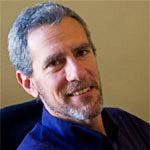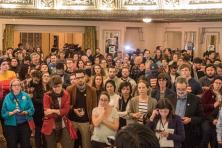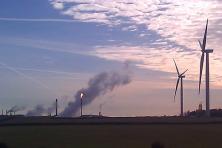As dusk settled on Lafayette Park last Sunday, after the successful “encirclement” of the White House, Bill McKibben was at the mic, wrapping up last Sunday’s inspiring “encirclement” of the White House – a “hug” for the President, urging him to reject the Keystone pipeline. His voice was full of grateful pride.
Just as he was wrapping up, he was interrupted by a message: the President’s motorcade was passing the north side of the park. Thousands still remaining in the park turned away from the stage and ran north toward the motorcade, shouting “Yes we can….Stop the Pipeline.”
Climate Progress has coverage and video here.
The motorcade capped a week of dramatic plot twists in the Keystone Pipeline saga. First the President’s spokesman, under pressure from reporters, tried to deflect the issue to the State Department. Then the President stepped up and accepted responsibility for the decision in an interview with a Nebraska TV station.
TransCanada executives complained bitterly that a delay in pipeline permitting would dramatically increase costs, leading to speculation that the project might not be financially solid enough to weather a protracted fight. Then, with permitting delays looking ever more likely, they changed their tune, suggesting that maybe a delay would not be fatal.
This is getting interesting. Boringly, however, the story has fallen deeply into the tired old jobs vs. environment frame. Most of the coverage is political football – an intriguing political mess for the President, as he navigates between two of “his constituencies” – labor and environmental groups.
The President’s remarks in the Nebraska TV interview were an encouraging sign that he is personally engaged and focusing on the tradeoffs. But, conspicuously, Obama avoided any mention of the climate impacts. It seems clear that the communication handlers have issued an edict against the use of the word climate.
There are at least two ways out of the jobs v. environment rut here. One is to note that the pipeline will create some construction jobs for a few years, but its purpose is to prolong fossil fuel dependence for decades. And fossil fuel dependence is, by any fair measure, a jobs disaster compared to spending the same energy dollars on efficiency and clean energy.
The other way out would be to talk about climate. Not to raise it as an “environmental issue.” But to talk seriously and bravely about what it really means. In political world, climate is an abstract preoccupation for the tiny sliver of voters who are primarily motivated by “environment”.
But in real world, in physical world, it’s an epic disaster in the making, with unthinkable humanitarian implications and of course devastating economic consequences. All the urgent words are verboten in political circles today – rude, naïve, unstrategic. And yet unforgivingly true.
Call me crazy, but wouldn’t a return to some semblance of objective reality on this subject introduce a new factor into the Keystone debate, one that rises above the tussle between political interest groups? Couldn’t a President appeal to something greater than interest group alignment – our future, our kids, our moral responsibility – in a way that would trump the political football game?
The signature chant of the protesters last Sunday was: “Hey, Obama, We Don’t Want No Climate Drama”. And if by drama what we mean is a serious public discussion, in which we actually name the issue, then neither, apparently, does he. But if he would, maybe he could find a principled way through the Keystone political obstacle course.
“Politically naïve”? Very possible. But if we don’t start groping for some political path back to reality, then we’ll keep losing, even when we “win.”




